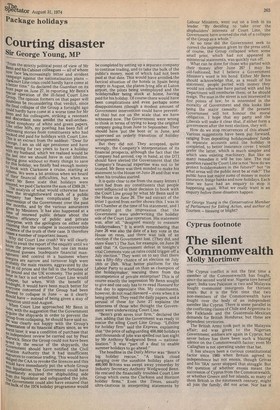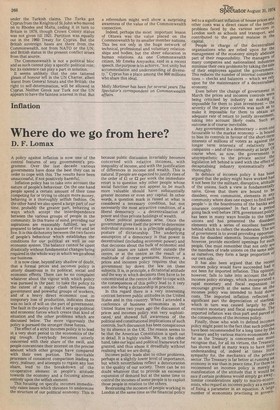Cyprus footnote
The silent Commonwealth
Molly Mortimer
The Cyprus conflict is not the first time a member of the Commonwealth has fought, since the second world war. Nigeria tore herself apart; India tore Pakistan in two and Malaysia fought communist insurgents for thirteen years. But it is the first time that two non-members of the Commonwealth have fought over the body of an independent member like Cyprus. There is some parallel in the conflicting claims of Chile and Argentina to the Falklands and the Guatemala-Mexican demands for British Honduras; but these are dependent territories.
The British Army took part in the Malaysia affair; aid was given to the Nigerian Government; soldiers are again in Cyprus; but never before has there been such a blazing silence on the Commonwealth factor; even Mr Callaghan is not operating under that hat.
It has always been a curious constitutional factor since 1960 when Britain agreed to independence but not enosis, though Grivas and his 'IRA' never stopped that struggle. But the question of whether enosis meant the succession of Cyprus from the Commonwealth, or whether Greece and her islands, so many of them British in the nineteenth century, might all join the family, did not arise. Nor has it under the Turkish claims. The Turks got Cyprus from the Knights of St John who moved on to Rhodes and Malta, ceding it in turn to Britain in 1878, though Crown Colony status was not given till 1921. Partition was equally out in the 1960 Treaty for Cyprus. But the British sovereign bases are there from the Commonwealth, not from NATO or the UN; and British status in the present conflict arises from that source.
The Commonwealth is not a political bloc and as such cannot play a specific political role; but its existence can play a part in solution.
It seems unlikely that the one tattered gleam of honour left in the UN Charter, albeit learnt from General Smuts and the British: the right to self-determination, will be allowed in Cyprus, Neither Greek nor Turk nor the UN appears to have the faintest interest in that. But a referendum might well show a surprising awareness of the value of the Commonwealth connection.
Indeed, perhaps the most important lesson of Ottawa was the value placed on the Commonwealth by its smaller member nations. This lies not only in the huge network of technical, professional and voluntary relationships and bodies, but the sheer education in human relations. As one Commonwealth citizen, Mr Emeka Amyaoku, said in a recent speech, the purpose is to achieve, "not unity but accommodation and understanding of diversity." Cyprus has a place among the 900 millions who share this ideal.
Molly Mortimer has been for several years The Spectator's correspondent on Commonwealth affairs.



































 Previous page
Previous page